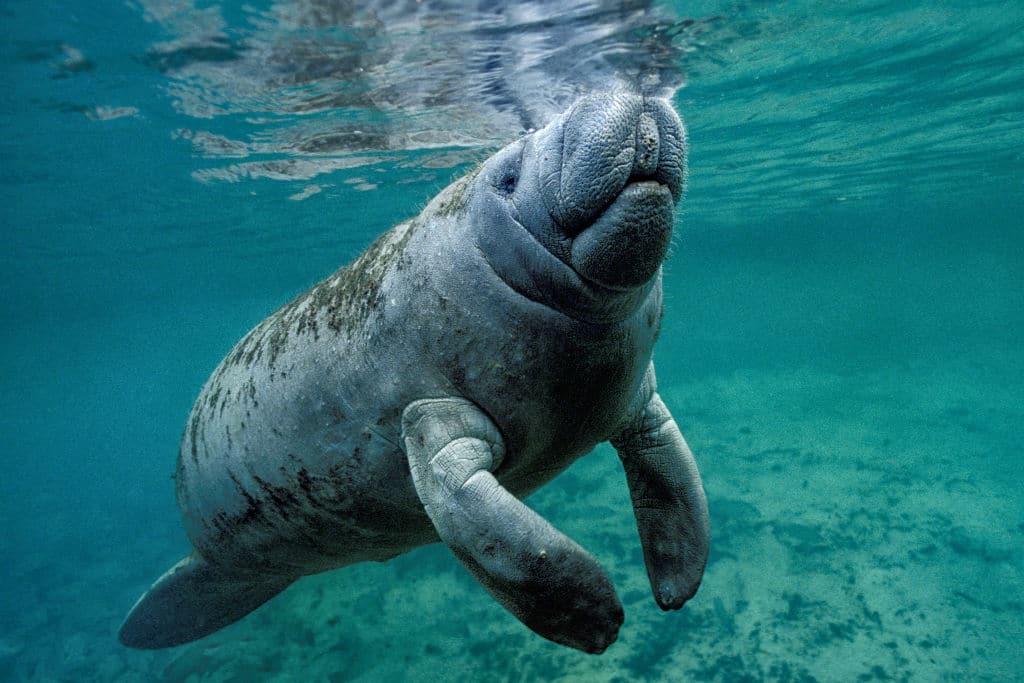Florida’s Starving Manatees Ate ‘Every Scrap’ of Food in Trial Feeding Program

 Why you can trust us
Why you can trust us
Founded in 2005 as an Ohio-based environmental newspaper, EcoWatch is a digital platform dedicated to publishing quality, science-based content on environmental issues, causes, and solutions.
In December of last year, Florida wildlife officials decided on an unprecedented way to try and save the state’s starving manatees: outright feeding them.
Now, as the trial feeding program draws to a close with warmer weather, officials say they can count it as a success.
“[The manatees have] eaten every scrap of food we’ve put out,” Scott Calleson of the U.S. Fish and Wildlife Service told AP News on Wednesday.
Florida’s iconic manatees are in the midst of an Unusual Mortality Event (UME), which began in 2020, according to the Florida Fish and Wildlife Conservation Commission (FWC). In 2021, more than 1,000 of the marine mammals died, according to FWC data. The UME is caused by the disappearance of seagrass in the manatees’ habitat in the Indian River Lagoon.
The manatees tend to winter the lagoon because the nearby Florida Power & Light Plant keeps the water warmer, as EcoWatch reported in December. However, seagrass there has declined by about 58 percent in the last 11 years, mostly because of nutrient pollution from agricultural runoff, which has fed the growth of algae that blocks the light the seagrass needs.
“Remember: Feeding manatees can harm them and it’s illegal,” FWC wrote on its website. “Leave it to the experts!”
To try to avoid last year’s catastrophic death toll, wildlife workers have fed the manatees around 160,000 pounds of lettuce at the power plant site since December, and the manatees have gobbled down “virtually all” of it, AP News reported. Calleson told AP News that wildlife workers would probably end up feeding the manatees a total of 200,000 pounds by the time the program ends in the next few weeks.
The feeding trial is drawing to a close because the manatees are moving away from the plant as the water warms, as AP News reported March 16.
“As spring brings warmer air and water temps across much of the state, manatees are naturally dispersing from their winter warm-water sites. Manatees have also been dispersing from the Temporary Field Response Station in Brevard County,” FWC wrote in a Facebook update.
However, this year’s success will help officials plan for next year by establishing a command structure and acquiring refrigerated trucks for the lettuce, AP News reported.
“When we begin to ramp up for next winter, we know all these things,” Jon Wallace of the U.S. Fish and Wildlife Service told AP News.
There are currently around 7,500 manatees in Florida, where they are considered a threatened species. Their 2021 death toll was the highest on record, and around 420 have died in 2022 as of March 11.
Anyone who sees a distressed manatee can call FWC’s wildlife hotline at 888-404-3922. However, officials note that ordinary people should still refrain from feeding them.
“Remember: Feeding manatees can harm them and it’s illegal,” FWC wrote on its website. “Leave it to the experts!”
Subscribe to get exclusive updates in our daily newsletter!
By signing up, you agree to the Terms of Use and Privacy Policy & to receive electronic communications from EcoWatch Media Group, which may include marketing promotions, advertisements and sponsored content.

 233k
233k  41k
41k  Subscribe
Subscribe 



